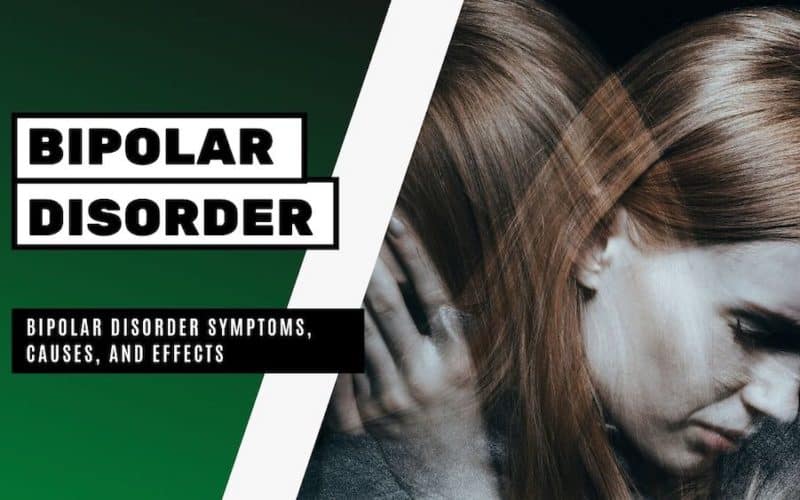Bipolar disorder, previously known as manic depression, is a mental health condition that causes extreme mood swings that include emotional highs (mania or hypomania; with mania being the more severe one) and lows (depression). Understanding the bipolar disorder types, symptoms, causes, and effects can help you to get the right type and level of care for yourself or a loved one.
Episodes of mood swings may occur a few or multiple times a year. Some people may experience specific emotional symptoms between these episodes, while some may not.
Table of Contents
Types and Symptoms of Bipolar Disorder
There are several types of bipolar disorder including:
-
Bipolar I disorder
Individuals with this have experienced at least one manic episode and could’ve experienced a depressive phase.
-
Bipolar II disorder
This is a milder form of the disorder, with individuals experiencing one major depressive episode and at least one hypomanic episode. Such people have not gone through a manic or more severe form of the ‘high’ phase.
-
Cyclothymic disorder
Symptoms of highs and lows do not reach such extremes in individuals with this form of the disorder.
-
Other types
These include bipolar disorders that are caused by drug and alcohol abuse or medical conditions, such as Cushing’s disease, multiple sclerosis, or stroke.
There are many symptoms of the ‘high’ phases including:
- Underperforming at or skipping work or school
- Judgment becomes impaired
- Feeling distracted or bored
- Thinking they have the right to do anything
- Feeling ‘wired.’
- Rapid talking
- Feeling that nothing is wrong
- Feeling on top of the world
- Coming up with ‘bizarre’ ideas, such as taking part in dangerous activities
- The feeling of increased self-confidence and self-importance
- Higher probability of engaging in risky behavior
During a depressive episode, a person may experience:
- Insomnia and other sleeping problems
- Anxiety, even about insignificant things
- Extreme sadness
- Eating less or more than usual
- Feeling gloomy and hopeless
- Feeling guilty and feeling that everything wrong is their fault
- Weight loss or weight gain
- Low attention span
- Weakened memory
- Feeling tired all the time
- Not being able to enjoy recreational activities
- Pain
- Extreme irritability
- Missing out on school or work
- Suicidal thoughts in severe cases
Moreover, another symptom common in both, manic and depressive episodes, is psychosis. Psychosis is when a person experiences delusions and hallucinations. They may be unable to differentiate between fantasy and reality.
People with bipolar disorder may believe that they are famous or have superpowers during a ‘high’ phase. During a depressive episode, they may believe they have committed a crime or that they are bankrupt.
Children and teenagers diagnosed with bipolar disorder are more likely to experience rapid mood changes, aggression and extreme anger, temper tantrums, and reckless behavior.
It is important to note that symptoms have to be episodic rather than chronic to receive a diagnosis of bipolar disorder. Moreover, all these symptoms can be cured by receiving the required treatment.
Causes of Bipolar Disorder:
Researchers have not yet discovered the exact cause of bipolar disorder, and the exact genes that cause the disorder are yet to be identified. Moreover, researchers are still working on understanding how the brain of a person with bipolar disorder physically changes.
However, certain factors that increase the risk of developing bipolar disorder are known. The disease can be inherited, so having a family member with the condition increases the risk greatly.
While this group of people is genetically more likely to develop the disorder, not all of these people develop bipolar disorder. This suggests that environmental factors and psychological factors can trigger manic or depressive phases. It is also true that not everyone with bipolar disorder will experience a triggering event.
Bipolar Disorder Risk factors include
1. Someone in the family has the disease
If you have a relative in your immediate family with bipolar disorder, such as a parent or sibling, then you may be at higher risk for developing a mood disorder. Symptoms may start showing during teenage years or early adulthood, with the average onset of symptoms being 25.
Researchers have also found that children of parents with severe mental illness had roughly a one-third chance of developing a severe mental illness by adulthood.
Moreover, the earlier age your parent is diagnosed with the disorder, the higher your risk is for also developing it. However, it can be said that genetics is not the only cause.
Studies of identical twins have shown that even if their relative has this inheritable disorder, both twins will not always develop it. This means that environmental factors have a role to play in increasing or decreasing the risk of developing bipolar disorder.
2. Increased levels of stress
People who experience traumatic events are at higher risk of developing bipolar disorder. Childhood events such as sexual or physical abuse, neglect, the death of a parent, or other traumatic events can increase the risk of bipolar disorder in adulthood.
Moreover, highly stressful events such as losing a job, or experiencing a death in the family can also trigger manic or depressive episodes.
3. Imbalances in the body
Imbalance of certain hormones in the body and chemicals in the brain can also trigger bipolar disorder.
4. Alcohol and drug abuse
Substance abuse does not directly cause bipolar disorder, but can highly increase the onset of symptoms and worsen manic or depressive phases. Sometimes certain medications can also trigger the onset of a manic or depressive episode.
5. Gender
Bipolar disorder can be diagnosed in both, women and men. But women are three times more likely to experience rapid transitions between manic and depressive episodes.
Effects of Bipolar Disorder:
The effects of manic and depressive phases can be short-term and long-term. Short-term effects include the inability to sustain employment, loss of self-confidence, and damage to social interactions and relationships.
If this condition is not treated, chances are that the person will experience more frequent episodes of mood fluctuations. Other long-term effects include loss of relationships, inability to maintain oneself, and becoming lost in delusions and hallucinations.
Sometimes people with bipolar disorder do not realize the severity of their symptoms. They may even enjoy the euphoria experienced during the manic phases, but this does not last long and is usually followed by extreme depression.
It is important to understand that this disorder does not get better on its own and receiving proper treatment is the most effective way to relieve the symptoms of bipolar disorder.





